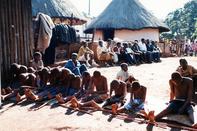Political Structure in Rural Areas
Elements of traditional political organization still exist in rural areas. The smallest unit is the household 'mudi', a family or a group of families of the same lineage, who live together in a collection of rondavels.

The mudi is under a mukoma, the father of the mudi's most important family. Succession to mukoma is usually hereditary, but formal approval must be given by the khosi 'king' of the subgroup to which the mudi belongs. The mukoma is responsible for order and government in the mudi.
His jurisdiction is confined to petty cases between members of the mudi, and his privileges are restricted to the right to expect obedience, free labour and tribute from members of his mudi. In judicial duties he is assisted by his council 'khoro'. Procedure is informal, and there is no voting: after discussion on a subject is exhausted, the mukoma reaches a decision and passes a verdict, which accords with majority feeling.
Should he oppose the khoro, he will try to persuade them to his viewpoint. Failing this, the matter is referred to higher authority. This has seldom happened, as the Venda system is flexible and characterized by a strong desire to avoid confrontation. Several units 'midi' form a kavhelo under a headman, whose privileges, duties and powers are similar to a mukoma's, on a larger scale. He is assisted by councils of heads of the midi, and older men from his own mudi.
A lushaka, people from various districts, under the authority of the same khosi, is the third tier, the largest political unit in Venda society. Today, traditional villages with stone walls may be found nestling under cliffs. Typically the king is at the highest part of the village, with his wives and family in front of him.
Others occupy the lower and surrounding areas, protecting the khosi and his wives. The entrance to the king's residential section is adjacent to the khoro 'public court'; access to the ruler, particularly by strangers, is limited. After permission has been granted to see him, subjects are taken through winding passages and up steps to the large rondavel that is the meeting place.
The King's Authority
Traditionally, a king had great power and influence, his secular authority grounded in spiritual might. He approached the ancestors on behalf of the nation; this marked the apex of a pyramid in which the mukoma could approach the ancestors on behalf of the household. It used to be thought that the king was the high priest, but now we understand the position better. In traditional society, the very young and old were accorded great respect and honour: the young were still close to the ancestors, and the old about to re-join them and become ancestors themselves.
As an extension of this, the khosi was a living ancestor. He had to be approached on hands and knees; he addressed everyone with condescension in the second person singular, but he had to be addressed in the polite third person plural. The distinction was also made between the king and his people in naming objects and actions associated with the king. For example, if the king were drunk, people would say he had 'fallen into a pool of water.
People would not refer to a king's death directly but would say, 'the pool has no more water. The language is spoken in his musanda 'royal capital' was highly symbolic and differed from that spoken by commoners. Because he was considered semi-divine, he was lauded for anything he did, no matter how mundane — coughing, drinking beer, even expectorating. It was not unusual for a king, as he grew old, to perform a solemn solitary dance 'u pembela', which turned him into a god 'Mudzimu'.
The khosi, though powerful, was not a tyrannical despot and had to operate within the laws and customs of society. Only in rare circumstances could he deviate, and this had to be sanctioned by his council. Mahosi were powerless, within taboo and ritual, to make alterations without the sanction of the people.
Some rituals were overseen by khosi's principal sister 'makhadzi', who ensured that tradition was followed. In the past kings were assisted in their functions by a council of the magota and dzinduna, as well as the vhakoma - brothers and cousin-brothers of the king - who lived nearest his palace or Great Place. Kings who tried to deviate too far from established tradition ran the risk of being poisoned by the wider royal family or having their subjects 'vote with their feet' and move away to the area of authority of another ruler.